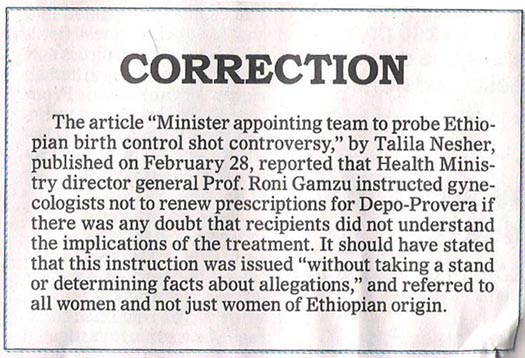CAMERA's Israel office has prompted corrections today in the English edition of Ha'aretz, whose story last week contained two factual inaccuracies concerning the controversy surrounding Depo-Provera contraception injections for Ethiopian women. As CAMERA reported earlier this week, the article ("Israeli minister appointing team to prove Ethiopian birth control shot controversy")
repeats a falsehood that first appeared in Ha'aretz's English edition Jan. 28 according to which Health Ministry Director General Prof. Rami Gamza supposedly confirmed claims of coerced injections of Depo-Provera, long-lasting contraception shots, for Ethiopian women in order to decrease the birth rate of Ethiopian immigrants. The page-one story Thursday (Feb. 28) states:About a month ago, Health Ministry director-general Prof. Rami Gamzu indicated there may have indeed have been some kind of policy to this effect, when he instructed the fourth health maintenance organizations to stop adminitering Depo-Provera injections as a matter of course. The ministry and other state agencies had previously denied knowledge or responsibility for the practice.The English edition's selective rendition of Gamzu's letter entails two serious omissions. First, contrary to the translator's formulation in which Gamzu's letter "indicated there may have indeed" been a policy to subject Ethiopian women to these shots against their will without being informed of possible side effects, the letter explicitly denied any confirmation of any such claims. Remarkably, the Hebrew version of the same article, but not the English, included this additional key excerpt from Gamzu's letter, appearing in bold below (CAMERA's translation):About a month ago, Ha'aretz reported that the Health Ministry director-general Prof. Rami Gamzu sent out a directive to the four health funds not to automatically give Ethiopian women the injection. "Without taking a position or establishing facts about the claims regarding this matter," the director-general wrote, "I request that all gynecologists working in or with the HMOs not renew Depo-Provera prescriptions for women of Ethiopian origin or other women if for any reason there is concern they might not undersand the ramifications of the treatment." (Emphases added.)Thus, while Ha'aretz's English edition would have readers believe the letter confirmed the claims about coerced injections, it does no such thing.
Today's correction (below) of the latest "Ha'aretz, Lost in Translation" appears on page 2 of the print edition.

The online edition has also been corrected, and the new text reads:
About a month ago, Health Ministry director-general Prof. Roni Gamzu instructed the four health maintenance organizations to stop administering Depo-Provera injections as a matter of course. The ministry and other state agencies had previously denied knowledge or responsibility for the practice.
"Without taking a stand or determining facts about allegations that were made," Gamzu wrote, "I would like to instruct, from now on, all gynecologists in the HMOs not to renew prescriptions for Depo-Provera for women of Ethiopian – or any other – origin, if there is the slightest doubt that they have not understood the implications of the treatment."
CAMERA commends Ha'aretz editors for the prompt and thorough correction. For past corrections that CAMERA and its Hebrew site, Presspectiva, have elicited at Ha'aretz, see here.
No comments:
Post a Comment